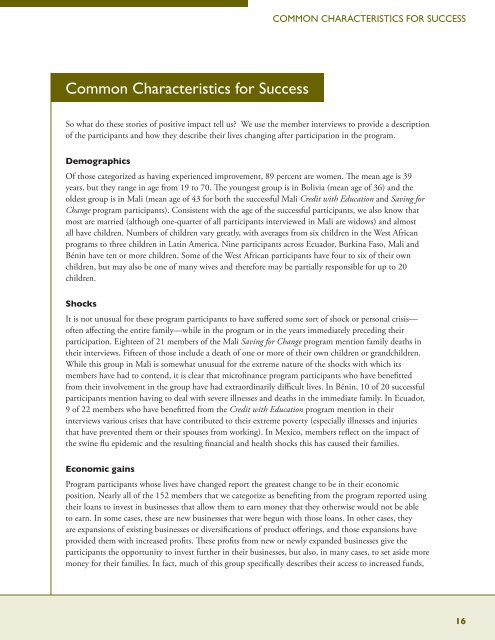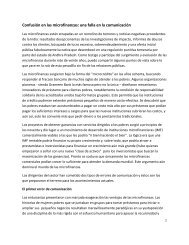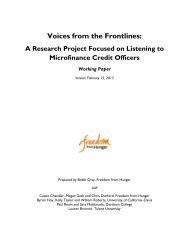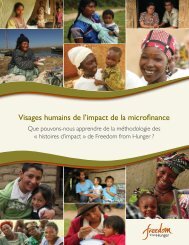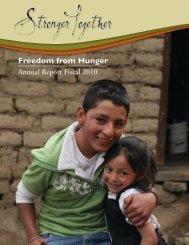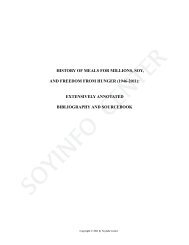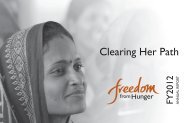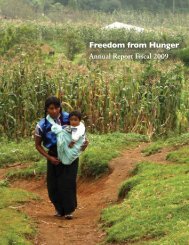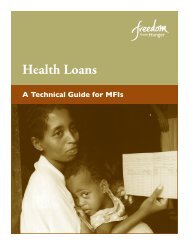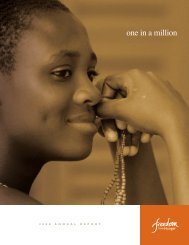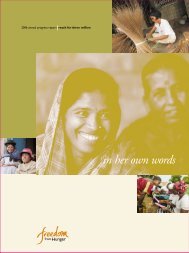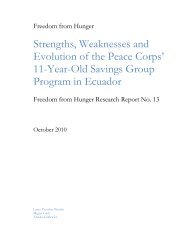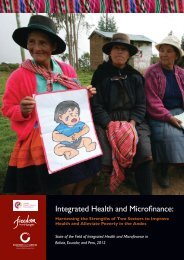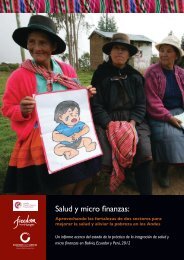English - Freedom from Hunger
English - Freedom from Hunger
English - Freedom from Hunger
You also want an ePaper? Increase the reach of your titles
YUMPU automatically turns print PDFs into web optimized ePapers that Google loves.
Common Characteristics for success<br />
CoMMon CHaRaCTeRIsTICs FoR suCCess<br />
So what do these stories of positive impact tell us? We use the member interviews to provide a description<br />
of the participants and how they describe their lives changing after participation in the program.<br />
Demographics<br />
Of those categorized as having experienced improvement, 89 percent are women. The mean age is 39<br />
years, but they range in age <strong>from</strong> 19 to 70. The youngest group is in Bolivia (mean age of 36) and the<br />
oldest group is in Mali (mean age of 43 for both the successful Mali Credit with Education and Saving for<br />
Change program participants). Consistent with the age of the successful participants, we also know that<br />
most are married (although one-quarter of all participants interviewed in Mali are widows) and almost<br />
all have children. Numbers of children vary greatly, with averages <strong>from</strong> six children in the West African<br />
programs to three children in Latin America. Nine participants across Ecuador, Burkina Faso, Mali and<br />
Bénin have ten or more children. Some of the West African participants have four to six of their own<br />
children, but may also be one of many wives and therefore may be partially responsible for up to 20<br />
children.<br />
Shocks<br />
It is not unusual for these program participants to have suffered some sort of shock or personal crisis—<br />
often affecting the entire family—while in the program or in the years immediately preceding their<br />
participation. Eighteen of 21 members of the Mali Saving for Change program mention family deaths in<br />
their interviews. Fifteen of those include a death of one or more of their own children or grandchildren.<br />
While this group in Mali is somewhat unusual for the extreme nature of the shocks with which its<br />
members have had to contend, it is clear that microfinance program participants who have benefitted<br />
<strong>from</strong> their involvement in the group have had extraordinarily difficult lives. In Bénin, 10 of 20 successful<br />
participants mention having to deal with severe illnesses and deaths in the immediate family. In Ecuador,<br />
9 of 22 members who have benefitted <strong>from</strong> the Credit with Education program mention in their<br />
interviews various crises that have contributed to their extreme poverty (especially illnesses and injuries<br />
that have prevented them or their spouses <strong>from</strong> working). In Mexico, members reflect on the impact of<br />
the swine flu epidemic and the resulting financial and health shocks this has caused their families.<br />
Economic gains<br />
Program participants whose lives have changed report the greatest change to be in their economic<br />
position. Nearly all of the 152 members that we categorize as benefiting <strong>from</strong> the program reported using<br />
their loans to invest in businesses that allow them to earn money that they otherwise would not be able<br />
to earn. In some cases, these are new businesses that were begun with those loans. In other cases, they<br />
are expansions of existing businesses or diversifications of product offerings, and those expansions have<br />
provided them with increased profits. These profits <strong>from</strong> new or newly expanded businesses give the<br />
participants the opportunity to invest further in their businesses, but also, in many cases, to set aside more<br />
money for their families. In fact, much of this group specifically describes their access to increased funds,<br />
16


